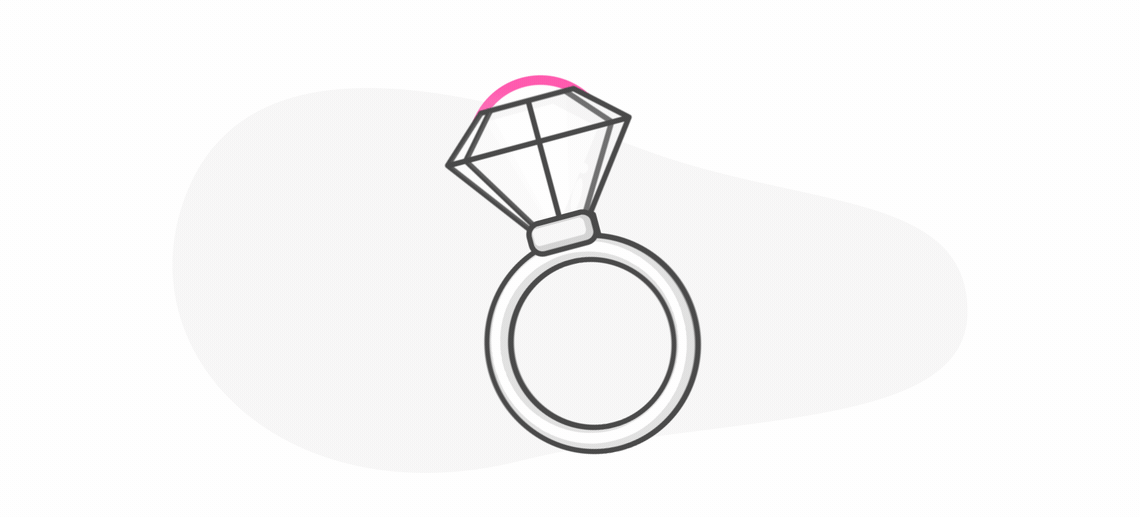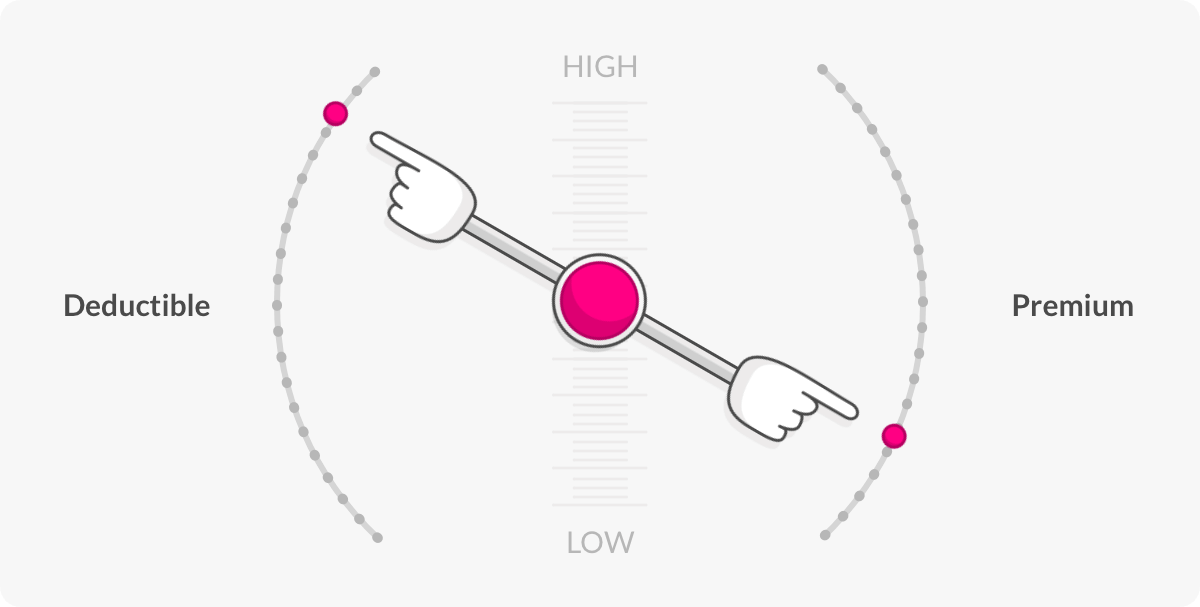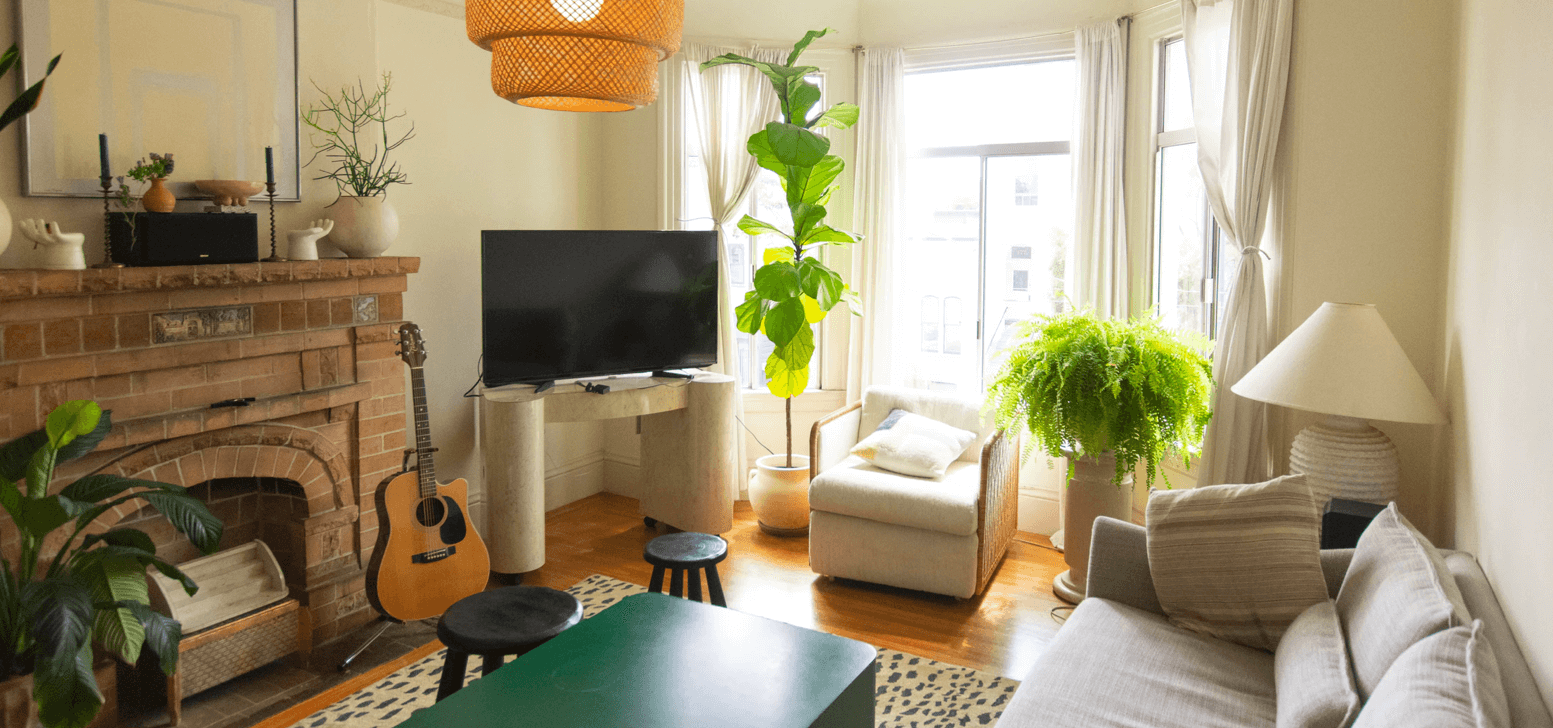While homeowners insurance is undeniably essential (and required for anyone with a mortgage), shopping for a policy can be a headache. But it doesn’t have to be!
Lemonade homeowners insurance makes the shopping process a breeze, so you can get wall-to-wall coverage for your home without ripping your hair out–or breaking the bank.
The average cost of homeowners insurance in the U.S. is approximately $179 a month, or about $2,151 a year; and, at Lemonade, homeowners policies start as low as $25 a month. However, your policy price will depend on a lot of factors—including the value, condition, and construction quality of your home, as well as your insurance history, previous claims and more.
Let’s dive into how to get the best coverage for your home, with a premium that works for your budget.
Let’s look at some steps you can take to lower your rates, as well as some of the factors that impact your rates.
1. Compare quotes
Whether you’re a first-time homebuyer or a seasoned homeowner, it’s always a good idea to keep your options open by comparing home insurance quotes. You don’t want to immediately commit to the first provider you get a quote from, or to continue on with one that’s become too costly.
Here are some general tips to help guide the process of finding the best and most affordable homeowners insurance for your needs:
- Check the policy details: When comparing quotes and rates, make sure you’re comparing policy details before making a decision. This includes deductibles, add-ons, and policy limits.
- Look into company claims handling: How will your homeowners insurance company handle your claim when the worst actually happens? How much does their claims process prioritize customer satisfaction?
- Don’t forget add-ons: Who all needs to be covered by your policy? FYI, with Lemonade, your family is covered by your policy automatically. In fact, all residents of your household related to you by blood, marriage, or adoption are covered. You also have the option of adding a non-legal partner as an additional insured, for a small fee.
For more info on how to compare homeowners insurance quotes, check out our comprehensive guide.
And don’t compromise on your coverage needs just because you’ve found the cheapest price. Instead, strive to strike a balance between quality and affordability.
Lemonade’s use of AI and machine learning means it has lower overheads and can offer rates as low as $25/month. But that doesn’t mean we’ve forgotten how important a human touch is. While AI Maya expertly handles our basic customer inquiries, we know the value of personalized interactions. Because Maya takes care of the small tasks, it frees up our (human) support team to help with particularly complicated insurance questions, like how to replace a lost engagement ring.

Plus, app-based insurance also makes your post-purchase experience a whole lot more convenient, allowing you to take care of everything in seconds, all in the palm of your hand. You can even use our app to file a claim—and also get paid within seconds.
Not satisfied with your current homeowners insurance? Check out these 7 steps to switching your homeowners insurance company. If you’re switching to Lemonade, we make it as simple as possible.
2. Increase your deductible
Switching to a higher deductible is a simple and straightforward way to get a cheaper policy. Increasing it from $1000 to $2500, for example, could mean big monthly savings. Just make sure that you’re comfortable paying more out of pocket should you need to file a claim.

3. Look for discounts
While you won’t find any Black Friday-style bargains on homeowners insurance (whose prices must be filed individually with each state), there are still a few ways to be a smart shopper.
One easy way to lower your premiums is to install more protective devices. If you have a home security system, smoke detectors, fire extinguishers, sprinklers, deadbolts, wind protection, water or temperature alerts, or a central station reporting alarm, you could qualify for an insurance discount.
You can also see what other discounts your provider might offer. Lemonade has its own ‘Get Discounts Now’ feature where you can help lower your premium by answering a series of questions about your home’s characteristics and safety measures like home renovations, or whether you live in a gated community.
4. Bundle insurance policies
Bundling different insurance policies together can unlock savings and discounts—for instance, you could combine homeowners and car insurance, or homeowners and pet health insurance.
And, with Lemonade, bundling also eliminates hassle by allowing you to handle all of your claims in one place. Let’s say your car gets broken into, leaving you with a shattered window and several stolen valuables. Since everything is digital, you’d be able to file both the auto insurance claim for your car window and the homeowners claim for your stuff in a single mobile app.
5. Make some home improvements
Making improvements to your home–such as replacing your roof or renovating it with fire-resistant materials like brick or stone–could also lead to potentially lower rates. Once you’ve made the updates, be sure to notify your insurer to see if you qualify for a discount.
6. Adjust your coverage amount
Like increasing your deductible, reducing your total coverage is another quick and easy way to lower your premium.
However, we recommend that you proceed with serious caution before making any drastic cuts–you wouldn’t want to end up in a situation where you’re denied coverage for something essential, like a costly reconstruction of your home.
Still, if you want to trim your coverage, you might considering doing an audit of everything you’re covered for and seeing if you’re still paying to cover things that you no longer have. If, for example, you’ve recently decluttered and parted ways with some expensive items, you could consider reducing the amount of personal property coverage you have.
If you’re unsure about how much coverage you need, check out our guide to each coverage type.
7. Understand the factors that impact your homeowners insurance premium
While you might be doing everything you can to find the cheapest rate, there are still some factors beyond your control to keep in mind when comparing your options. An affordable quote in tornado-prone Kansas is going to look pretty different from an affordable quote in a less disaster-prone state like Utah.
Here are some other factors that affect your rate:
Weather conditions in your state
States with a higher chance of natural disasters tend to have higher premiums. For example: Louisiana, Texas, Florida, Oklahoma, and Kansas have the highest premium for homeowners insurance. It’s no coincidence that Florida, Texas, and Louisiana are coastal states that are most vulnerable to frequent and severe storms, while Oklahoma and Kansas are smack dab in the middle of Tornado Alley.
Materials your home is built with
The more likely your home will crumble in a natural disaster, the more expensive your homeowners insurance will be. This takes into account everything from your roof’s material and shape to your home’s building construction and heating type.
Loss history in your neighborhood
If your neighborhood has a lot of theft claims, your premium could be higher.
Your claims history
If you’ve made multiple insurance claims in the past five to seven years, insurers will assume you’re more likely to do so again, which could land you with a higher premium. However, typically only claims that are more than $500 above your deductible will impact your premium.
Your credit history
Statistically, people with lower credit scores file more insurance claims, so your credit score could hurt your premium too. Having good credit also communicates to insurers that you’ve been on top of the kinds of payments that help you maintain your home.
Guest liabilities
If you have a pool or trampoline, your insurer might charge you a higher premium. Owning certain dog breeds, or a dog with a prior history of biting, could also lead to a price spike, since homeowners insurance can cover dog bites as part of your personal liability coverage.
Many of these factors can’t be helped, but it’s still useful to consider them when assessing your options. That way you can get a sense of what “cheap” or affordable insurance means for your circumstances.
Before you seal the deal…
There’s a lot to consider when shopping for homeowners insurance, but Lemonade homeowners insurance streamlines the process of building a policy to help put you–and your wallet—at ease.
Click below to start your free quote.
A few quick words, because we <3 our lawyers: This post is general in nature, and any statement in it doesn’t alter the terms, conditions, exclusions, or limitations of policies issued by Lemonade, which differ according to your state of residence. You’re encouraged to discuss your specific circumstances with your own professional advisors. The purpose of this post is merely to provide you with info and insights you can use to make such discussions more productive! Naturally, all comments by, or references to, third parties represent their own views, and Lemonade assumes no responsibility for them. Coverage and discounts may not be available in all states.




